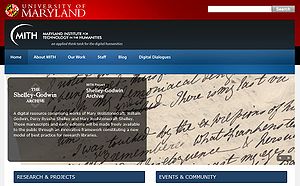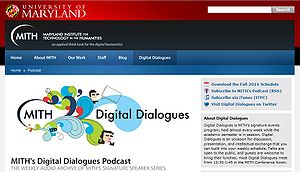CIRCA:Maryland Institute for Technology in the Humanities
From CIRCA
| Line 5: | Line 5: | ||
*A collaborative effort between University of Maryland’s College of Arts and Humanities, Libraries, and Office of Information Technology | *A collaborative effort between University of Maryland’s College of Arts and Humanities, Libraries, and Office of Information Technology | ||
| - | == Overview | + | == Overview == |
[[image: podcast.jpg|thumb|300px|right| MITH podcast page]] | [[image: podcast.jpg|thumb|300px|right| MITH podcast page]] | ||
*MITH is a physical and electronic home to a wide variety of [http://mith.umd.edu/research/ digital humanities projects and events] | *MITH is a physical and electronic home to a wide variety of [http://mith.umd.edu/research/ digital humanities projects and events] | ||
| Line 14: | Line 14: | ||
*Offers free access to a variety of media such as [http://mith.umd.edu/podcast/ podcasts], [http://vimeo.com/channels/mith/ on-line videos], slide shows, and [http://mith.umd.edu/podcast/ scholarly talks] that discuss current issues within humanities computing | *Offers free access to a variety of media such as [http://mith.umd.edu/podcast/ podcasts], [http://vimeo.com/channels/mith/ on-line videos], slide shows, and [http://mith.umd.edu/podcast/ scholarly talks] that discuss current issues within humanities computing | ||
*Archives and showcases projects that span various fields and are interdisciplinary by nature | *Archives and showcases projects that span various fields and are interdisciplinary by nature | ||
| + | |||
| + | == Purpose == | ||
| + | |||
| + | In an [https://digital.library.emory.edu/webfm_send/363/ interview] with Kim Collins from Emory University, Neil Fraistat, the director of MITH states that the center's focus is on the research and development of: | ||
| + | *digital archives | ||
| + | **performing arts | ||
| + | ***cyberinfrastructure | ||
| + | ****tool building | ||
| + | *****Digital Cultures and Creativity (DCC) Curriculum | ||
== Audience == | == Audience == | ||
Revision as of 17:57, 28 September 2011
Contents |
History
- Founded in 1999
- Funded by a major Challenge Grant from the National Endowment for the Humanities
- A collaborative effort between University of Maryland’s College of Arts and Humanities, Libraries, and Office of Information Technology
Overview
- MITH is a physical and electronic home to a wide variety of digital humanities projects and events
- Internationally recognized and distinguished by the cultural diversity it promotes and embodies through projects such as The Visual Accent & Dialect Archive
- Operates as a meeting place and think tank for the digital humanities
- Promotes, provides, and encourages innovative research surrounding text mining, data analysis, and visualization techniques
- Focused on the genesis, structure, and preservation of electronic literature, digital games, and virtual worlds
- Offers free access to a variety of media such as podcasts, on-line videos, slide shows, and scholarly talks that discuss current issues within humanities computing
- Archives and showcases projects that span various fields and are interdisciplinary by nature
Purpose
In an interview with Kim Collins from Emory University, Neil Fraistat, the director of MITH states that the center's focus is on the research and development of:
- digital archives
- performing arts
- cyberinfrastructure
- tool building
- Digital Cultures and Creativity (DCC) Curriculum
- tool building
- cyberinfrastructure
- performing arts
Audience
MITH offers a diverse set of projects that are sure to interest a broad range of audiences. Digital humanists, scholars, educators, technologists, and intellectuals will find a host of projects worth investigating. What follows are links to just a few of the projects currently associated with the Maryland Institute for Technology in the Humanities.
Literary Projects:
Archival Projects:
Performing Arts Projects:
Be sure to explore the MITH site for other current and archived projects.
Significance
The Maryland Institute for Technology in the Humanities is significant in that it provides a successful model or template for other Digital Humanities Centers to follow.


